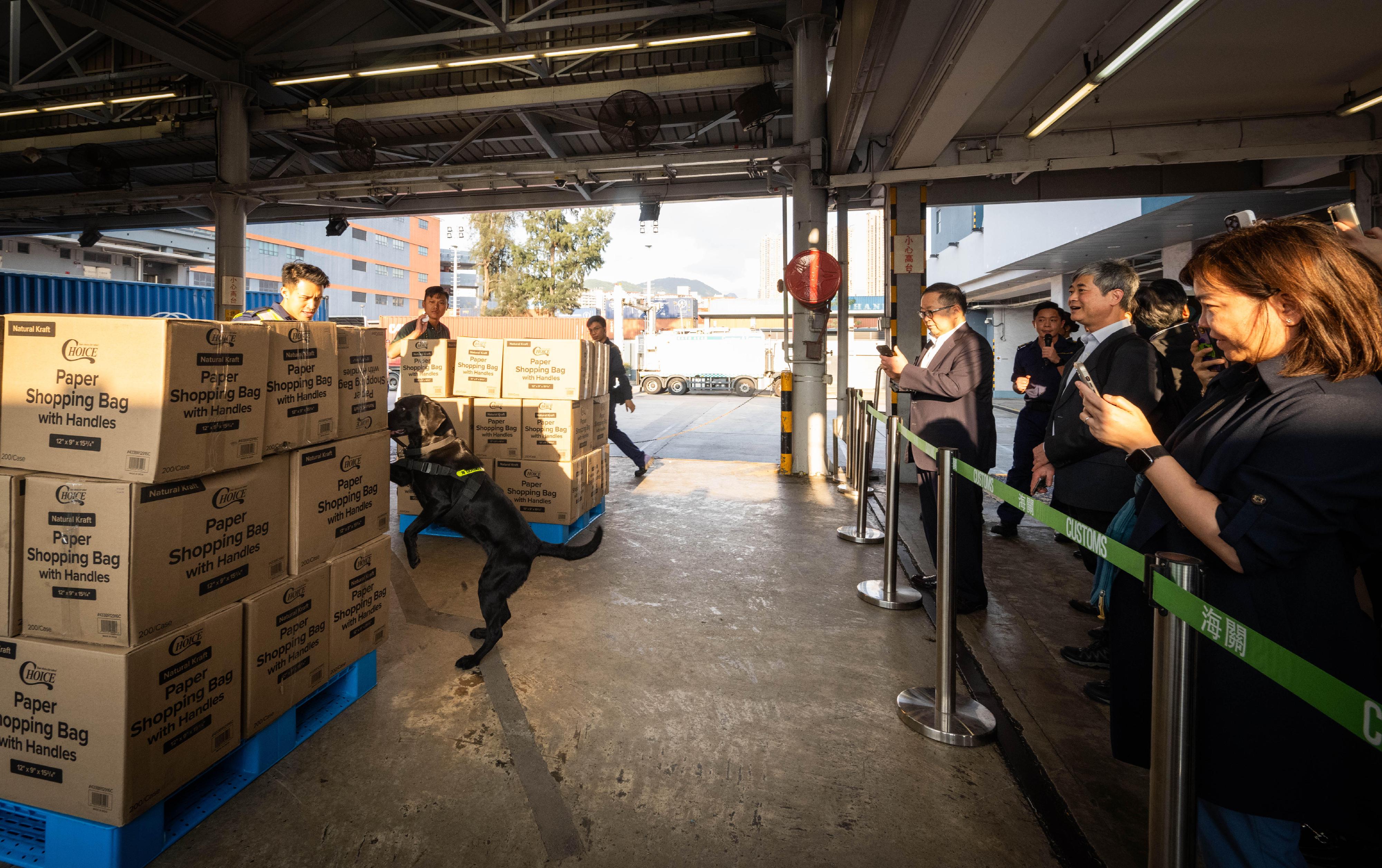Drug abuse and drug situation in Hong Kong in 2023 (with photos)
****************************************************************
Figures from the CRDA revealed that the total number of reported drug abusers in 2023 increased by 3 per cent (from 5 363 to 5 500) compared with that in 2022. The number of reported young drug abusers aged under 21 declined by 11 per cent (from 744 to 659). The most common type of drugs abused in 2023 was heroin, followed by cocaine and methamphetamine (commonly known as "Ice"), while cocaine, cannabis and ketamine (commonly known as "K") remained as the three most common types of drugs abused among young drug abusers aged under 21.
According to the figures from law enforcement agencies, the number of persons arrested for drug offences in 2023 decreased by 15 per cent (from 4 005 to 3 406) compared with that in 2022. For the same period, the number of young arrestees aged under 21 decreased by 33 per cent (from 483 to 323), and cannabis and cocaine were the main drugs involved. In addition, according to the court cases concluded in 2023, among persons prosecuted for drug offences, the share among them being convicted was as high as 87 per cent.
Speaking on the 3 per cent increase in the total number of reported drug abusers in 2023, the ACAN Chairman, Dr Donald Li, said, "As Hong Kong resumed normalcy in full in 2023 after the COVID-19 pandemic, changes are also observed in the drug situation. Although the total number of reported drug abusers in 2023 was still lower than the ones in 2019 or 2018, the ACAN has already reminded relevant government departments to pay close attention to the changes in the drug situation, and has also suggested that they should continue various anti-drug promotion."
The ACAN continues to express concern about the cocaine abuse situation. Cocaine was the most common type of psychotropic substance abused in 2023. For the same period, cocaine was also the most common type of drug abused among the reported young drug abusers aged under 21, with over half of them (55 per cent) having abused cocaine. When categorising arrests for drug offences by drug types, the number of persons arrested for offences related to cocaine was also the highest. Dr Li added, "Cocaine is rampant across the globe. The ACAN noted that the law enforcement agencies in Hong Kong have detected many cocaine trafficking cases, and have enhanced collaboration with the Mainland and other places overseas. As for dealing with the situation locally, the Narcotics Division (ND) has stepped up promotion of the harmful effects of cocaine abuse. The ACAN will support the Government to keep implementing measures targeting cocaine abuse, as this drug is highly addictive and could be fatal."
In order to enhance the public's understanding of the harmful effects of cocaine abuse, the Narcotics Division has launched a new TV Announcement in the Public Interest (API) and the corresponding radio API, which describe abusing cocaine as sinking deep into a quagmire. Cocaine abuse will not only cause physical and mental harm, but will also cost its abusers their life savings, and burden them with enormous debts since they cannot get rid of the addiction to the drug. Furthermore, the ND has also produced an animated video, which is about how a young person with bright prospects had been controlled by his "inner demons" and paid a heavy price for one wrong decision: trying cocaine. Both videos have been uploaded onto the ND's website (www.nd.gov.hk/en/cocaine_info.html).
In addition to cocaine, the ACAN also discussed online drug traps at today's meeting, which include different groups inviting others to join drug taking activities through instant messaging and dating applications. In some cases, drugs would also be associated with sex. The ND will continue to closely liaise with the anti-drug sector and co-ordinate relevant training. This will help frontline workers have a better understanding of the characteristics and culture of different communities, and make more timely interventions with suitable treatments, with a view to encouraging early help-seeking from drug abusers. The ND reminds members of the public that they should avoid drug traps by staying vigilant against drug traffickers when using social media and dating applications as drug dealers are also using those applications.
The Chairman and members of the ACAN visited the Kwai Chung Customhouse after the meeting to learn about the latest drug enforcement work of the Customs and Excise Department (C&ED), including the use of advanced examination equipment (such as ion scanners, raman spectrometers and mobile X-ray vehicle scanning systems), and the deployment of Customs Detector Dogs during cargo clearance in order to detect drugs more accurately.
Dr Li said the C&ED has been making great efforts to combat drugs over the years. The ACAN expressed full support for the C&ED's upcoming international participation and commitments, including taking up the role of the next World Customs Organization Vice-Chairperson for the Asia-Pacific Region, which will further consolidate the leadership position of the C&ED in the global customs community. The ACAN believes such an international involvement of the C&ED will contribute to combating drug problems at source and building a drug-free Hong Kong.
The website of the ND (www.nd.gov.hk) contains detailed information about drugs, including frequently asked questions about cocaine, for the public's reference. Members of the public can send messages to 98 186 186 through instant messaging applications WhatsApp and WeChat, or call the 24-hour hotline 186 186, to seek information or assistance from professional social workers.
The figures of the CRDA for 2023 are also available on the website of the ND (www.nd.gov.hk/en/crda_main_charts_and_tables.html).
Ends/Wednesday, February 21, 2024
Issued at HKT 16:30
Issued at HKT 16:30
NNNN







